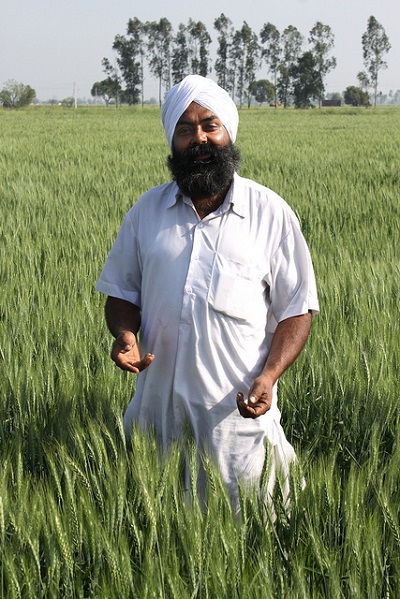
EL BATAN, Mexico (CIMMYT) — A study from CIMMYT scientists has revealed new insights on the respective benefits of conventional tillage (CT) and zero tillage (ZT) in north-west India.
Degradation of natural resources, increasing farm labor scarcity, and high production costs are major threats to north-west India’s rice-wheat cropping system.
Sustainable intensification practices, like switching from puddling then transplanting of rice to dry seeding, together with changing from CT to ZT for wheat with surface retention of rice residues, have proven to be very effective in maintaining or even boosting crop yields while preserving environmental resources.
However, whether using ZT for both crops brings additional benefits to either crop is not known. The effects of surface retention of rice residues in wheat on the subsequent DSR crop are also unknown, nor how this is affected by tillage for DSR.
In response, a field study was conducted during 2012-2014 to investigate the interactions between CT and ZT for rice and wheat, and both conventional and sustainable rice residue management, on the performance of a dry seeded rice-wheat system.
Researchers found that while surface retention of rice residues improved the growth of ZT wheat and this effect appeared early during the first crop, rice residue retention in wheat had an adverse effect on growth of the subsequent DSR crop in the first year. In addition, tillage treatment for rice did not affect wheat performance, and vice versa, over the first five crops.
Read more about the study “Effects of tillage and mulch on the growth, yield and irrigation water productivity of a dry seeded rice-wheat cropping system in north-west India” and other recent publications from CIMMYT scientists below:
- A taxonomy-based approach to shed light on the babel of mathematical models for rice simulation. 2016. Confalonieri, R.; Bregaglio, S.; Adam, M.; Ruget, F.; Tao Li; Hasegawa, T.; Yin, Y.; Zhu, Y.; Boote, K.; Buis, S.; Fumoto, T.; Gaydon, D.S.; Lafarge, T.; Marcaida III, M.; Nakagawa, H.; Ruane, A.C.; Singh, B.; Singh, U.; Tang, L.; Fulu Tao; Fugice, J.; Yoshida, H.; Zhao Zhang; Wilson, L.T.; Baker, J.; Yubin Yang; Yuji Masutomi; Wallach, D.; Acutis, M.; Bouman, B. Environmental Modelling & Software 85: 332-341.
- Effects of tillage and mulch on the growth, yield and irrigation water productivity of a dry seeded rice-wheat cropping system in north-west India. 2016. Naveen-Gupta.; Sudhir-Yadav; Humphreys, E.; Kukal, S.S.; Singh, B.; Eberbach, P.L. Field Crops Research. 196: 219-236.
- Evaluation of the effects of mulch on optimum sowing date and irrigation management of zero till wheat in central Punjab, India using APSIM. 2016. Singh, B.; Humphreys, E.; Gaydon, D.S.; Eberbach, P.L. Field Crops Research 197: 83-96.
- High-temperature adult-plant resistance to stripe rust in facultative winter wheat. 2016. Akin, B.; Xianming Chen; Morgounov, A.I.; Zencirci, N.; Anmin Wan; Meinan Wang. Crop and Pasture Science. Online First.
- Identification of earliness per se flowering time locus in spring wheat through a genome-wide association study. 2016. Sukumaran, S.; Lopes, M.S.; Dreisigacker, S.; Dixon, L.E.; Meluleki Zikhali; Griffiths, S.; Bangyou Zheng; Chapman, S.; Reynolds, M.P. Crop Science: 56.

 Nutrition, health and food security
Nutrition, health and food security 
